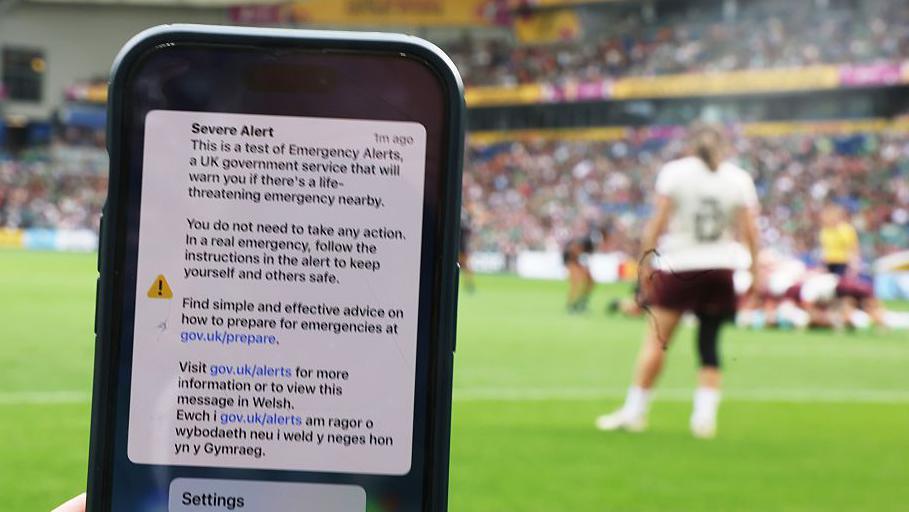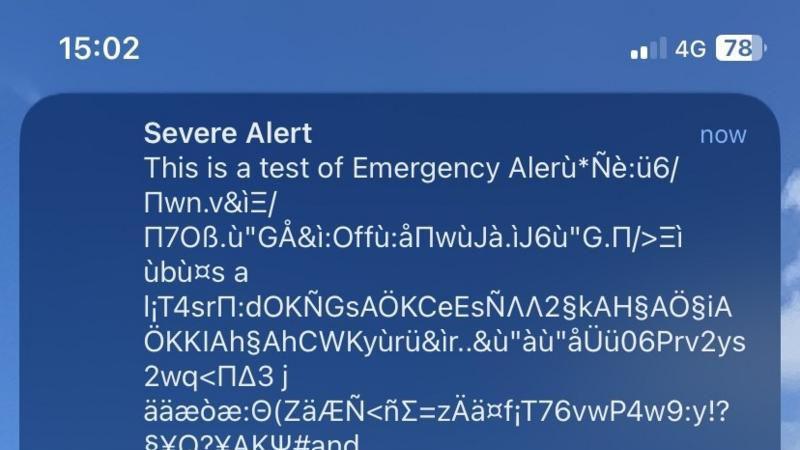Sirens blare from millions of phones in national test of emergency alerts
Moment alert rings during BBC broadcast
- Published
Siren sounds have blared from mobile phones across the country in a test of the national emergency alert system.
At around 15:00 on Sunday, mobiles vibrated and sounded for about 10 seconds in the second test of the system.
British Prime Minister Sir Keir Starmer said "tens of millions of phones successfully sounded" in the test, which he said was "an important step in keeping people safe during national emergencies".
Sporting and other events had to adjust for the alert. The women's Rugby World Cup match between Ireland and New Zealand in Brighton paused mid-game, while theatre-goers were advised to turn off their phone before curtains up.
Mobile phone users received a message making clear that the alert was a drill.
The alarm happened between overs at England's third ODI cricket match against South Africa at Southampton. Fans had been warned via a message on the big screen about the alert.

The Ireland vs New Zealand Women's Rugby World Cup match in Brighton resumed after a short delay
Drivers were urged not to be distracted behind the wheel.
A video posted on social media shows the siren sounds blaring inside the usually tranquil British Library in London. One patron can be heard whispering "shush".
At the BBC, the alert was covered in a live broadcast as presenters checked to see whether their phones were sent the alert.
The system appeared to reach into the tunnels of London's Underground. A couple said they received their alerts while on a Tube train heading towards Liverpool Street Station.
Mark, 44, of Essex, told the PA news agency: "It came through twice for me. The whole Tube carriage's phones started going when we got signal."
His partner Abby said no one appeared surprised.
Some people did seem to experience problems with the test. The BBC's science reporter Esme Stallard and other users received a garbled message with her alert.
But a government spokesperson said the alert message "was broadcast correctly and mobile operators have confirmed that the test ran as expected".

The message received by science reporter Esme Stallard
The first national test in 2023 was largely successful, although there were some reports of no alerts being sent, or too late.
The government has used the system to issue real warnings five times, including in January during Storm Eowyn to warn people in Scotland and Northern Ireland about severe weather.
Approximately 3.5 million people across Wales and south-west England received an alert during Storm Darragh last December.
A 500kg unexploded Second World War bomb found in a Plymouth back garden triggered a warning to some 50,000 phones in February last year.
Messages can be targeted to relatively small areas to pinpoint those at risk.
Around 15,000 phones were alerted during flooding in Cumbria in May 2024, and 10,000 received a warning during flooding in Leicestershire in January this year.
The system is designed for use during the most likely emergencies to affect the UK and warnings would also be transmitted on television, radio and locally by knocking on doors.
Government officials also met domestic violence charities and campaigners for discussions on helping those who needed to opt out of the test.
Watch: Emergency Alert goes off at British Library
Get in touch
Do you have questions about the Emergency Alert test?